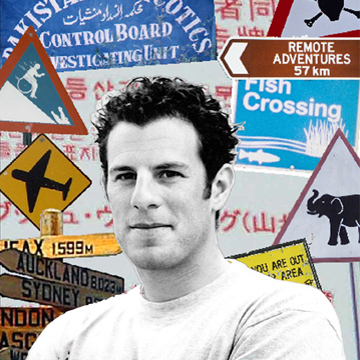Doug Lansky im Interview:
„Where’s a good place to learn?“
Doug Lansky war Praktikant bei der „David Letterman Late Night Show“, bis er sich entschied, lieber Weltreisender zu sein. Seit 1992 reist Doug um die Welt und hat mehr als 120 Länder bereist. Doug schreibt als Reiseautor u.a. für den Lonely Planet, Rough Guides, National Geographic Traveler und weitere Reisemagazine. Ausserdem war er Host einer Reise-Radioshow und hat über 10 Reisebücher veröffentlicht. Ich traf Doug auf der Reisemesse ITB in Berlin. Ich wollte wissen, wie das ist, mit dem lokalen Leben auf Reisen und seinem Leben als Reiseautor.
Doug, at the ITB show in Berlin you hold the very entertaining keynote on ”The Real Travel Trends“. You stated that you consider it to be important, to make a “local experience” if you travel abroad. What exactly does that mean?
DL: It means something you don’t have to buy a ticket for or wait inline for (unless you’re just about the only tourists you can see doing it). It means playing basketball with locals, or bird watching with locals, or whatever it is you like to do. It can be having dinner at the home of a local or grabbing a beer with a local in town. Something where you’re speaking with a local and not paying them for the privilege.
Which person and / or book inspired you most to start travelling?
DL: Wasn’t a book… was just getting a small taste of independent travel, then bigger then not wanting to stop.
You first hit the road in 1992. What did you get started and what has changed since?
DL: I just wanted to get away from London for the weekend and none of my fellow university students wanted to join me to head up to Edinburgh, so I went alone. That may have been the gateway for me.
What has changed is that I’m not longer so interested to go to some city and look around… I want to do something. So I won’t think…”I’d like to see Shanghai” even though I’ve never been and it’s probably really interesting. Instead I think “I’d like to try taking a Chinese cooking course” – where’s a good place to learn how to do that?
Why do only few people live the free, nomadic life you have been living and why do only few people seem to wish making “local experiences”?
DL: Those are 2 very different questions… the nomadic life is expensive to sustain for a long period. When you stop to work, you need a place to live and maybe a car, and then it’s easy to get stuck. Plus we are probably hardwired to settle down and make babies.
As for local experiences, it’s hard for companies to make money on that and it’s not easy to mass produce and offer up to bus loads of tourists.
What is your biggest challenge being on the road?
DL: When you’re going for a long time, it’s not getting burned out…. All those new sights, sounds, smells, tastes can get exhausting without you realizing it. That’s why I always try to plan a longer stop every 2-4 weeks.
You are a travel writer. Do you do other work than writing during your travels? Any odd jobs experiences you like to share with us?
I’ve done all sorts of odd jobs… mango picking in Israel, DJ at Club Med in Bali, snowmobile guide in the French Alps.
Considering all your travels, all the travelers and locals you met on the way: Which experience impressed you most?
DL: The ones where I had fewest expectations. It’s easy to think some famous place is going to be great because you’ve heard so much about it. My favorite things were never the big attractions… they involved meeting people and doing something interesting.
Which three items do you always carry with your luggage if you travel?
DL: Superglue, duct tape, Imodium and – in developing countries — a seatbelt.
You can watch Dougs entertaining keynote on „The Real Travel Trends“ here.
28. April 2013


